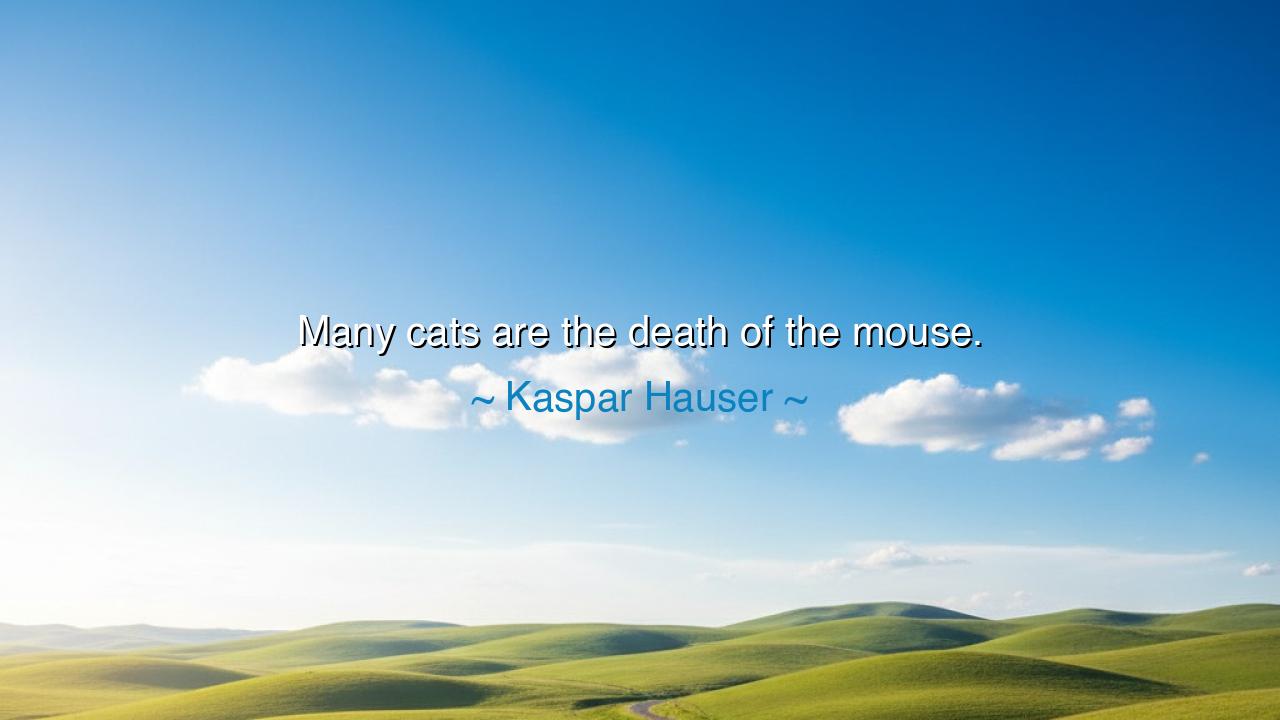
Many cats are the death of the mouse.






Hear the strange yet piercing words of Kaspar Hauser, the child of mystery who once said: “Many cats are the death of the mouse.” At first glance, the saying appears as nothing more than the observation of nature’s law: that prey, when surrounded by predators, cannot hope to endure. Yet within this simplicity lies a teaching both sharp and eternal. It is not merely about cats and mice, but about the nature of danger, the burden of odds, and the fragility of the vulnerable when outnumbered by the strong.
The mouse, in this proverb, is the symbol of the weak, the small, the defenseless. Alone, it may dart and escape, finding holes in the wall or shadows in which to hide. Against one cat, it may even outwit or outrun, for fortune often favors the quick and desperate. But when the many cats gather, when opposition multiplies, cunning is crushed beneath inevitability. Thus, the saying is not about cruelty, but about inevitability: when forces array against the small in overwhelming number, the end is certain.
The ancients themselves bore witness to this truth. Recall the fall of Carthage, besieged not once but thrice by the power of Rome. Carthage was clever, wealthy, and resilient—the mouse of the Mediterranean with teeth enough to bite. Against one enemy it may have survived, but Rome was legion, Rome was relentless, Rome was many cats. At last the walls fell, the city was razed, and the mouse was no more. Hauser’s words echo through such history: the balance of numbers often outweighs the brilliance of the few.
And yet, there is also a warning here against oppression by multitude. For it is not always noble for the many to bring down the one. The image of the cats is not only natural, but also moral: it reminds us how easily strength becomes cruelty when numbers are turned against the weak. A mouse may be small, but it is still a life, and when the many gather to destroy the one, we must ask: is this justice, or is it simply domination? In this way, the proverb calls us to beware the arrogance of majority and the ease with which many forget the worth of the few.
Consider too the story of Socrates, condemned not by one accuser but by the voices of the crowd. Alone, he could have defended himself against any single opponent, but the weight of the multitude, the many cats of Athens, brought about his death. And yet in his death, he revealed another truth: though the mouse may fall to the cats, its memory may endure, and its spirit may teach even after its body is gone. Thus the story reminds us that being outnumbered may end life, but not legacy.
The teaching, then, is layered. It warns of vulnerability—that the weak cannot hope to endure when surrounded by overwhelming force. It warns of cruelty—that the many must take care not to trample the few in their strength. And it inspires courage—for though the mouse may perish, its struggle may plant seeds of truth and justice in the hearts of those who watch. What is lost in life may still live in lesson.
The lesson for us is this: when you are the mouse, take courage, for even if you fall, your dignity in struggle may outlast the claws of the cats. When you are among the cats, take caution, for power multiplied by numbers may tempt you toward injustice. Let mercy temper strength, and let justice restrain cruelty. Remember always that what is many today may be few tomorrow, and that fate often reverses the roles of hunter and hunted.
So let your action be this: do not join the many cats when they hunt down the small without cause. Stand apart, speak for the weak, shield the vulnerable. And when you yourself are the mouse, do not despair—for even in defeat, truth and courage may make your life greater than the numbers that rise against you. For truly, as Kaspar Hauser declared, “Many cats are the death of the mouse”—but only if the world forgets the worth of the mouse itself.






AAdministratorAdministrator
Welcome, honored guests. Please leave a comment, we will respond soon